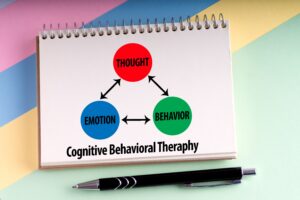What is CBT?
Do you feel bogged down with life’s stresses and pressures? Are you struggling to make sense of the different approaches for mental health treatment? CBT can be your solution. But what is CBT?
Cognitive-behavioral therapy (CBT) is an evidence-based psychotherapy that helps individuals become more mindful of how their thoughts, emotions, and behaviors are linked and how they affect daily living. Through CBT, clients can learn to effectively reduce destructive patterns of behavior that contribute to feelings of distress.
Join us as we explore the basics of CBT, its key components, strategies utilized by practitioners who use this form of therapy, and its applications in clinical practice.
What is CBT (Cognitive Behavioral Therapy)?
Cognitive Behavioral Therapy (CBT) is a type of psychotherapy that focuses on identifying and changing negative thought patterns and behaviors. CBT is based on the idea that our thoughts, feelings, and behaviors are interconnected, and that our thoughts can often lead to negative emotional and behavioral responses.
By identifying these negative patterns and replacing them with positive ones, CBT can help individuals manage and overcome a wide range of emotional and psychological issues, such as anxiety, depression, and addiction. Through cognitive restructuring, behavior modification techniques, and other therapeutic interventions, CBT can provide individuals with the skills and tools they need to effectively cope with life’s challenges and improve their mental health and well-being.
How Does CBT Work to Change Thoughts and Behaviors Over Time
Cognitive Behavioral Therapy, commonly known as CBT, is a widely researched and effective form of therapy that focuses on changing negative thoughts and behaviors. Unlike traditional psychotherapy, CBT is goal-oriented and highly structured, making it clear that progress is being made.
By identifying automatic negative thoughts and challenging their accuracy, individuals are able to develop more positive and realistic beliefs about themselves and the world around them. CBT also emphasizes behavioral changes that support these new beliefs, leading to lasting results over time. By utilizing CBT techniques, individuals are empowered to take control of their thoughts and actions, leading to a happier and more fulfilling life.
Advantages of CBT for Mental Health Treatment
Cognitive Behavioral Therapy (CBT) has become a popular and effective approach for treating mental health concerns. Unlike traditional therapeutic methods, CBT is a short-term and goal-oriented approach that focuses on identifying negative thinking patterns and behaviors and replacing them with healthier alternatives.
One of the main advantages of CBT is that it can be used to treat a variety of mental health conditions, such as anxiety disorders, depression, PTSD, and OCD. Another advantage is that CBT equips individuals with the necessary skills and coping strategies to manage their symptoms long-term. Overall, CBT is a valuable tool for improving mental health and enhancing overall well-being.
Who Benefits Most from CBT

Cognitive Behavioral Therapy (CBT) is one of the most popular forms of therapy used today, known for its effectiveness in treating a variety of mental health conditions. But who benefits most from CBT? The answer is really anyone who is willing to put in the effort.
However, research has shown that CBT tends to be particularly effective for individuals who struggle with anxiety, depression, or other mood disorders. It’s also been found to be a helpful tool in managing stress and improving communication skills. Regardless of your specific mental health needs, CBT can offer valuable strategies and techniques for improving your overall well-being.
How to Find a Professional Who Practices CBT
If you’ve been struggling with anxiety, depression, or other mental health issues, Cognitive Behavioral Therapy (CBT) could be the right treatment for you. However, finding a professional who practices this type of therapy can be overwhelming. One effective way to start your search is by asking your primary care doctor for recommendations.
You can also search for licensed therapists online, making sure to double-check their credentials and experience. Another option is to reach out to organizations like the National Association of Cognitive Behavioral Therapists or local mental health clinics for referrals. Remember, finding the right therapist is crucial and takes time, but it’s worth it for the positive impact CBT can have on your mental health.
Questions to Ask When Choosing a Therapist for CBT Services
Choosing a therapist to provide cognitive-behavioral therapy (CBT) services can be a daunting task. CBT is a type of therapy that focuses on identifying and changing negative thought patterns and behaviors. When searching for a therapist who specializes in CBT, it’s important to ask the right questions. First, ask about their qualifications and training in CBT.
You want to ensure they have the proper education and experience to provide effective treatment. Next, explore their approach and techniques used for CBT. Different therapists have varying styles and methods, so it’s essential to find a therapist whose style feels like the right fit for you. Finally, inquire about their availability and scheduling options, including fees and insurance coverage.
Remember, choosing a therapist for CBT can be a significant investment in your mental health, so it’s crucial to do your research and find a therapist with whom you feel comfortable.
Cognitive Behavioral Therapy (CBT) is an effective treatment for many mental health concerns and can be an important element in any treatment plan. CBT works by helping the individual recognize and challenge distorted thinking patterns, thus offering individuals insight into their behaviors and helping them to move forward with more positive behaviors.
With its wide variety of techniques and strategies, those experiencing issues ranging from depression to anxiety can benefit from this strongly evidenced-based approach. To get the most out of this therapy, it’s essential to find a professional therapist who is skilled in CBT. Researching questions such as their experience with CBT or what types of therapies they offer can be useful in finding your ideal therapist. Long story short, CBT is a top choice for attacking many mental health concerns so that you may overcome and live life on your terms!

If you think that Cognitive Behavioral Therapy might benefit you, seek out a qualified mental health professional today!
Ready To Get Started
Take the first step towards the future you deserve.
What Our Clients Say
-
I have so much to say about this wonderful place, but I’m sure my words will never do my experience justice. Southern Live Oak Wellness and it’s people not only helped me find myself again, but they saved my life.
Alex M.
Johns Creek, GA -
Southern Live Oak Wellness saved my life. The therapists genuinely care about the clients and helping them get better. Working on yourself is not easy, but the therapists help guide you and make you be able to work through whatever may be going on.
Rachel S.
Lawrenceville, GA -
I can easily say that Southern Live Oak wellness saved my life. I had hit rock bottom when I first got admitted and they helped me build myself up from nothing. I have learned how to cope with things I never thought I would be able to handle.
Taylor R.
Dallas, GA
-
Going to SLOW has impacted my life in ways I never thought possible. I came for help with my mental state and came out with so much more; life skills, medical advice, mental health counseling and addiction treatment. SLOW is a whole life transformation program and I highly recommend it to anyone I know!
Kaylan F.
Kennesaw, GA -
When I was a part of this program, I had the most personal growth I’ve had in my entire life. All of the tech staff were willing to talk to me whenever I felt like I needed someone to talk to and the group sessions gave me multiple perspectives I never would’ve thought of from people in similar situations to me.
Dylan C.
Belleville, IL -
This place has changed my life. For the first time in my life I felt heard and cared about. The clinical staff is amazing. The groups are well structured. You learn a lot of different skills to help you in life this is the best mental health facility to come to.
Ashley H.
Brunswick, GA

